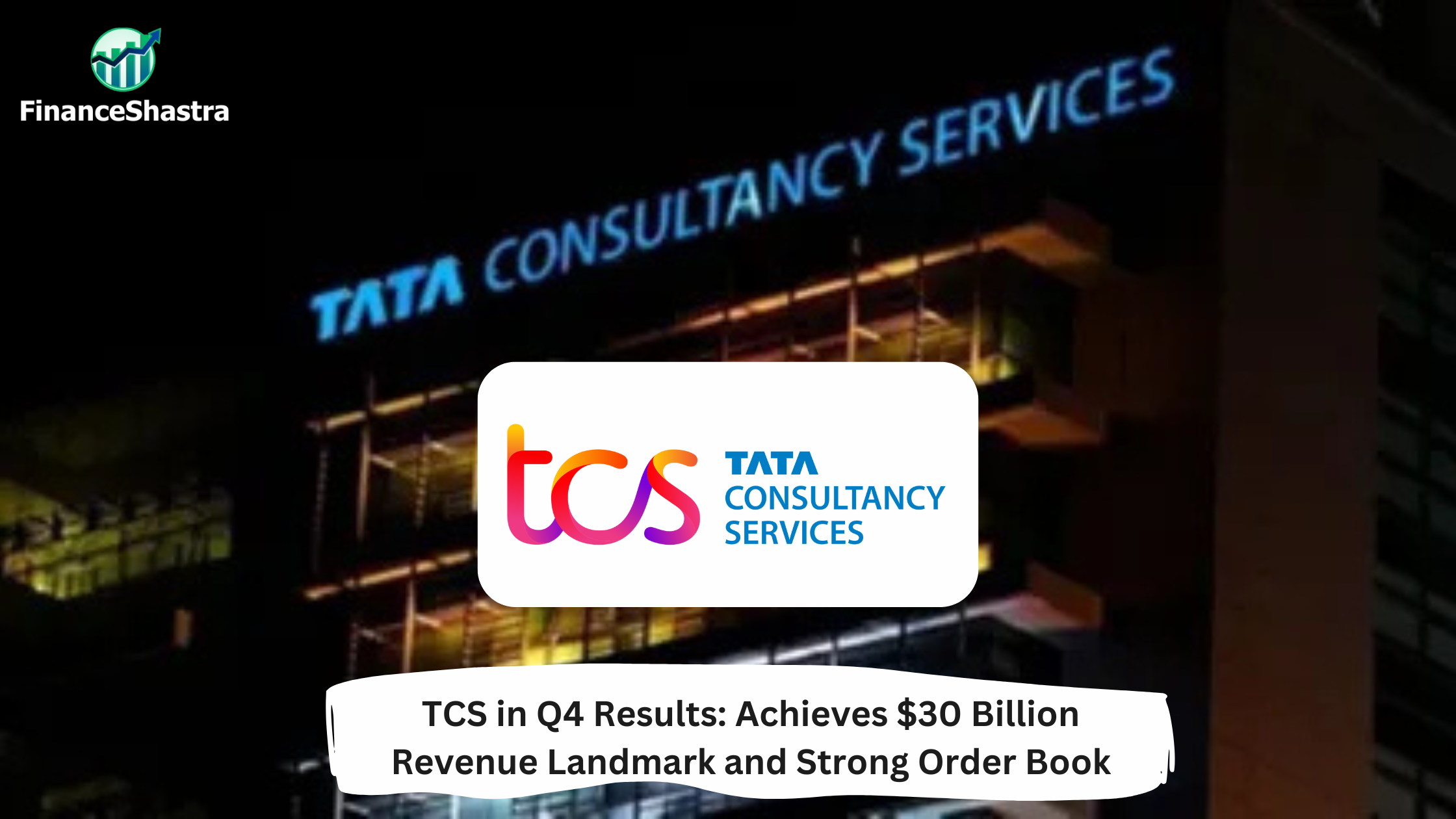TCS in Q4 Results: Achieves $30 Billion Revenue Landmark and Strong Order Book
Business and Industry Overview:
Tata Consultancy Services (TCS) is a global leader in IT services and consulting. It is based in Mumbai, India, and is part of the Tata Group. The company was founded in 1968. Today, TCS is one of the largest IT companies in the world. It operates in more than 55 countries. TCS employs over 607,000 people. TCS provides a wide range of services. These include IT services, digital transformation, consulting, and business solutions. The company works with many industries, such as banking, financial services, insurance, healthcare, and manufacturing. TCS uses a special method called Location Independent Agile to deliver its services. This helps them serve clients in different parts of the world. TCS is known for its focus on innovation. The company collaborates with universities and startups to create new solutions. This is done through their Co-Innovation Network. This network helps TCS develop new technologies and improve services. Apart from business, TCS is also involved in sponsorships and community activities. The company sponsors major events like the New York City Marathon and the London Marathon. In India, TCS sponsors the World 10K Bangalore and the Rajasthan Royals IPL team. They also provide technology support for player performance analysis and stadium security. TCS continues to be a major player in the IT industry. The company focuses on growth, innovation, and supporting communities.
Latest Stock News:
As of April 12, 2025, Tata Consultancy Services (TCS) is facing some problems in the stock market. On April 11, 2025, the share price of TCS was ₹3,232.30. It fell by 0.43% on that day. The price is 29.5% lower than its 52-week high. The highest price in the last year was ₹4,585.90 on September 2, 2024. The trading volume was 229,229 shares. This is much higher than the 50-day average of 87,670 shares. This means more people are buying and selling the stock.
TCS also shared its financial results for the fourth quarter of the financial year 2025. The company earned ₹644.79 billion in revenue. This is 5.3% more than the same quarter last year. But this was still less than what experts expected. They thought the revenue would be ₹647.58 billion. The net profit was ₹122.24 billion. This is 1.69% lower than last year’s profit in the same quarter. The company said this happened because of problems in the North American market. Many companies there reduced their spending on IT. Also, tariff issues made it harder to do business.
Even after weak results, some experts are still hopeful. Prabhudas Lilladher gave a ‘Buy’ rating to TCS. They think the price will go up to ₹4,160. Another firm, Sharekhan, also gave a ‘Buy’ rating. Their target price is ₹4,050. This shows they believe the stock will rise again. TCS also announced a final dividend for FY2025. This means shareholders will receive some money. Even though this quarter was not strong, experts think TCS will do better in the future because of good deals, a strong brand, and cost control.
Business Segments:
1. IT Services: TCS gives many technology services to other companies. They make software and apps for their needs. They also take care of old systems and keep them updated. TCS helps companies move their work and data to the cloud. This means using online storage like AWS, Google Cloud, or Microsoft Azure. TCS also looks after servers, networks, and storage. They protect company data from hackers by giving cybersecurity services.
2. Consulting: TCS advises companies. They help them use the right technology. TCS helps make a good IT plan. They also help when a company wants to change how it works. This is called business transformation. TCS helps companies follow rules and reduce risks. They also show better ways to do work and save money.
3. Digital Transformation: TCS helps companies become more modern. They use new tools like AI (Artificial Intelligence) and machine learning. These tools help make smart choices. TCS also studies company data to find useful things. This is called data analytics. They use software bots to do simple jobs. This is called automation. TCS connects machines and devices using IoT (Internet of Things). They also use blockchain for safe and clear work in finance and supply chain.
4. Engineering and Industrial Services: TCS helps companies design and make new products. They work with cars, machines, and electronics. TCS makes a digital copy of the real product. This is called a digital twin. It helps to test the product before making it. TCS checks if the product works well. This is called a testing service. They also help factories work faster and smarter using machines and software. This is called smart manufacturing.
5. Business Process Services (BPS): TCS helps with the daily office work of other companies. They manage financial work like bills, payments, and reports. They also help with HR work like salaries, staff records, and hiring. TCS answers customer calls and emails for some companies. They help with orders, storage, and delivery. This is supply chain work. In banking and insurance, TCS manages paperwork and regular tasks like checking forms and processing claims.
Subsidiary information:
1. TCS iON: TCS iON helps with digital learning and online exams. It gives services to schools, colleges, and government bodies. They make platforms for exams, results, and digital content. This helps schools and colleges go digital. It makes learning and testing easier and faster.
2. CMC Limited: CMC Limited was a government-owned company. TCS bought it to grow its business. CMC provides IT services like software, system design, and IT advice. It helps many industries, such as banking and healthcare. It also helps government projects in India with technology.
3. TCS Japan Ltd.: TCS Japan is a joint company with Mitsubishi. TCS owns most of it. This company helps Japanese businesses with IT services and advice. It helps them improve technology, make better systems, and move to digital platforms.
4. TCS China: TCS China helps Chinese companies with IT and technology services. It works in areas like manufacturing, finance, and retail. It helps businesses in China grow and improve using digital solutions. TCS China helps TCS reach the big market in China.
5. TCS Financial Solutions: TCS Financial Solutions makes software for banks and finance companies. Their main product is TCS BaNCS. It helps banks with things like core banking, payments, and insurance. It helps financial companies run their systems smoothly and safely.
6. Diligenta Limited (UK): Diligenta is a UK company that helps with insurance and pension services. It works with big insurance companies to help with tasks like managing policies, claims, and customer service. Diligenta helps these companies work faster and better using technology.
7. TCS e-Serve (Now Merged): TCS e-Serve used to be called Citigroup Global Services. It handled back-office and customer support services. This included things like managing transactions, doing paperwork, and helping customers. TCS merged e-Serve into the main company to offer more complete services.
8. TCS Sverige AB (Sweden): TCS Sverige is in Sweden. It gives IT services to businesses in the Nordic countries like Sweden, Norway, and Denmark. It helps industries such as banking, retail, and manufacturing with digital services, cloud computing, and data solutions.
Q4 Results Highlights:
- Revenue declined by 1% sequentially, compared to the expected 0.8% drop.
- Margins were below expectations, at 24.2% instead of the predicted 24.8%.
- TCS won $12.2 billion worth of deals during the quarter.
- The board approved a final dividend of ₹30 per share.
Financial Summary:
| Amount in ₹ Crore | Q4 FY24 | Q4 FY25 | FY23 | FY24 |
| Revenue | 64,479.00 | 61,237.00 | 240,893 | 255,324 |
| Expenses | 44,073.00 | 47,499 | 176,597 | 187,917 |
| EBITDA | 17,164 | 16,980 | 64,296.00 | 67,407.00 |
| OPM | 28% | 26% | 27% | 26% |
| Other Income | 1,157 | 1,028 | 3,464 | 3,962 |
| Net Profit | 16,849.00 | 16,402.00 | 46,099 | 48,797 |
| NPM | 26.13 | 26.78 | 19.14 | 19.11 |
| EPS | 34.37 | 33.79 | 126.88 | 134.2 |


